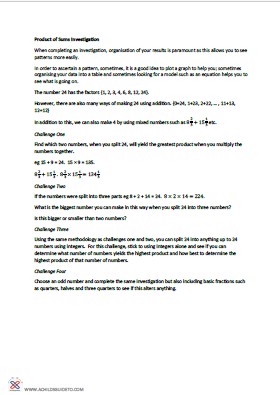Telling the Time

Basic starter for telling the time. You will need sound on to benefit from this.

Monday's Maths Club takes place in MA2 and is for those people who need a little extra help with their maths. We also have a cohort of people who are good at maths who come to help those that find it more difficult. Here are some of the resources we use which you may find useful to help your child at home.

For those with difficulty with number sense and working out how many there are. A few colour pencils would be really useful with this work. The file on the right tells you what is available and offers some hints on their use.

Useful information for those who might have difficulty in remembering what some maths terms mean.

Useful exercises on grids and basic statistics descriptions, fractions, mixed numbers and cuboids.

Calculate the area of compound rectilinear shapes by finding missing sides and then multiplying length and breadth together.

Key Stage Two SATs Level 3 questions from the actual SATs papers.

Key Stage Two SATs Level 4 questions from the actual SATs papers.

Key Stage Two SATs Level 5 questions from the actual SATs papers.

Cut up the numbers and see if you can build Pascal's Triangle to the 11th row. There are spare numbers for when some go missing. These are in different colours so that the sets don't get mixed up if you are using them with a class. I have done this activity with Year 3 to 9 and they have really enjoyed it.

Cut up the numbers and see if you can build Pascal's Triangle to the 11th row. There are spare numbers for when some go missing. These are in different colours so that the sets don't get mixed up if you are using them with a class. I have done this activity with Year 3 to 9 and they have really enjoyed it.

Cut up the numbers and see if you can build Pascal's Triangle to the 11th row. There are spare numbers for when some go missing. These are in different colours so that the sets don't get mixed up if you are using them with a class. I have done this activity with Year 3 to 9 and they have really enjoyed it.

Cut up the numbers and see if you can build Pascal's Triangle to the 11th row. There are spare numbers for when some go missing. These are in different colours so that the sets don't get mixed up if you are using them with a class. I have done this activity with Year 3 to 9 and they have really enjoyed it.

This works well with the number cards that are on this page. This booklet introduces some of the patterns that can be found in Pascal's Triangle looking at prime numbers, indices, factors, multiples and prime factors, square numbers and square roots.

Look at the eight times table and an unusual pattern. Separately, examine the famous Konisburg Bridge Problem.

Every row has to have numbers 1 to 9. Every column has to have numbers 1 to 9. Each bold box of 9 has to have numbers 1 to 9. Can you solve this blank puzzle?

Split the number 24 into numbers that sum to this total. Multiply them and find the highest product you can.